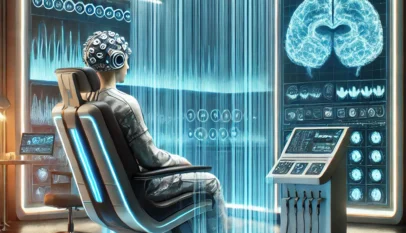OCD Online Therapy: Effective Solutions for Managing Obsessive-Compulsive Disorder
OCD online therapy offers a valuable resource for individuals seeking effective treatment for obsessive-compulsive disorder from the comfort of their homes. For many, it provides accessible support and proven methods tailored to address specific symptoms, making it a pragmatic choice in today’s digital age. Incorporating various therapeutic approaches such as cognitive-behavioral therapy (CBT), these sessions can help clients develop coping strategies and reduce the impact of their OCD.
The flexibility of online therapy allows individuals to schedule sessions that fit their lifestyles, eliminating barriers often associated with in-person visits. With professional guidance, clients can engage in meaningful dialogue that fosters growth and understanding of their condition. This personalized format often enhances the therapeutic alliance, which is crucial for success in managing OCD.
As awareness of OCD grows, so does the availability of resources like online therapy. This modality not only broadens access to qualified mental health professionals but also empowers individuals to take proactive steps toward recovery. Embracing this option could lead to significant improvements in quality of life for those affected by OCD.
Understanding OCD
Obsessive-Compulsive Disorder (OCD) involves persistent, unwanted thoughts and repetitive behaviors. Recognizing the symptoms, causes, and impact on daily life is crucial for comprehension and effective intervention.
Defining Obsessive-Compulsive Disorder
Obsessive-Compulsive Disorder is a mental health condition characterized by two main components: obsessions and compulsions. Obsessions are intrusive thoughts, images, or urges that cause significant anxiety or distress. Compulsions are repetitive behaviors or mental acts performed in response to obsessions, aimed at reducing anxiety or preventing a feared event.
OCD is typically diagnosed when these obsessions and compulsions interfere with daily functioning. The severity of the disorder can vary. Some individuals may experience mild symptoms, while others may find their lives profoundly impacted.
Common Symptoms and Behaviors
Common symptoms of OCD include:
- Obsessive thoughts: Fear of contamination, doubts about safety, or needing things to be orderly.
- Compulsive behaviors: Excessive handwashing, checking locks repeatedly, or arranging items in specific ways.
These behaviors can consume significant time, often taking hours each day. Individuals may recognize that their thoughts and behaviors are irrational, yet feel powerless to control them.
Causes and Risk Factors
The exact cause of OCD remains unclear; however, it likely involves a combination of genetic, neurological, and environmental factors. Family history plays a role, as individuals with relatives who have OCD are at higher risk.
Neurobiological factors may include imbalances in brain chemicals, particularly serotonin. Additionally, stressful life events or trauma can trigger the onset of OCD in some individuals.
Impact on Daily Life
OCD can significantly impact daily life and functioning. Individuals may struggle with personal relationships, work responsibilities, and routine activities.
Challenges faced include:
- Social Isolation: Fear of judgment may lead individuals to withdraw from social activities.
- Reduced Productivity: Compulsive rituals can interfere with work or school performance, leading to missed deadlines.
- Emotional Distress: The constant battle with intrusive thoughts can lead to feelings of shame, frustration, and anxiety.
Effective management is essential for improving quality of life, allowing individuals to cope better with the disorder.
Online Therapy for OCD
The rise of digital health has transformed how individuals access care for Obsessive-Compulsive Disorder (OCD). Online therapy provides various advantages while offering a range of therapeutic options and guidance on finding the right therapist.
Benefits of Online Therapy
Online therapy for OCD offers several compelling benefits. Accessibility is a major advantage, allowing individuals to seek help from the comfort of their homes, which can reduce anxiety about attending in-person sessions.
Flexibility is another key factor; appointments can often be scheduled to fit into busy lifestyles. Additionally, online therapy can provide access to specialists who may not be available locally.
Participants often appreciate the anonymity afforded by online interactions, which can ease initial apprehension about discussing sensitive topics like OCD. This environment encourages openness and honesty, critical factors for effective treatment.
Types of Online Therapy Available
Several types of online therapy are effective for treating OCD. Cognitive Behavioral Therapy (CBT) is the most commonly used approach, focusing on changing patterns of thinking and behavior.
Exposure and Response Prevention (ERP), a specific type of CBT, is particularly effective for OCD. It involves gradual exposure to anxiety-provoking thoughts and situations while teaching skills to manage compulsive responses.
Teletherapy sessions conducted via video conferencing allow for real-time interaction and support. Alternatively, text-based therapy offers asynchronous communication, which may be easier for some individuals.
Each of these options can be tailored to meet individual needs, ensuring a personalized approach to treatment.
Finding the Right Therapist
When seeking an online therapist for OCD, it is essential to consider specific qualifications. Look for professionals who specialize in treating OCD and possess relevant credentials, such as licensure in mental health fields.
Recommendations from trusted sources can also be valuable. Individuals may consult doctor referrals or read online reviews to find therapists who resonate with their needs.
It’s important to assess therapy compatibility during initial consultations. Potential clients should feel comfortable and understood, as this relationship is vital for effective treatment. Many therapists offer a brief consultation to assess fit before committing to ongoing sessions.
Integrating Online Therapy with Traditional Treatments
Combining online therapy with traditional treatments can enhance overall effectiveness. Many clients find that medication, when prescribed by a psychiatrist, works well alongside online therapeutic practices.
Integrating therapy can also provide coordinated care, focusing on the unique challenges faced by individuals with OCD. Therapists may collaborate with other healthcare providers to create comprehensive treatment plans.
In addition, support groups facilitated online can complement one-on-one therapy. Engaging with others facing similar challenges can foster a sense of community and shared understanding, crucial for recovery.
Top Infant Care Services Near Me for Early Childhood Support
Finding reliable infant child care near you is essential for parents seeking a safe and nu…















